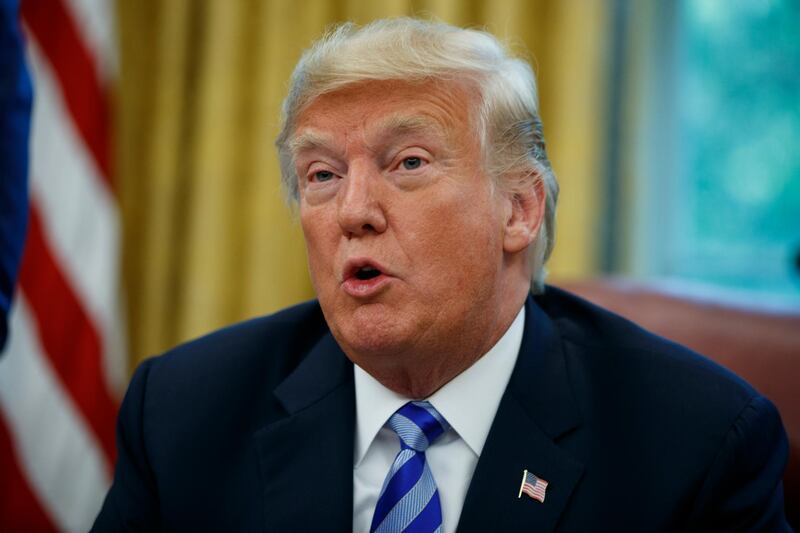President Donald Trump said he would pull out of the World Trade Organisation if it does not treat the United States better, targeting a cornerstone of the international trading system.
“If they don’t shape up, I would withdraw from the WTO,” Mr Trump said in interview with Bloomberg News at the Oval Office. He said the agreement establishing the body “was the single worst trade deal ever made”.
A US withdrawal from the WTO potentially would be far more significant for the global economy than even Mr Trump’s growing trade war with China, undermining the post-Second World War system that the US helped build.
Mr Trump said last month that the US was at a big disadvantage from being treated “very badly” by the WTO for many years and that the Geneva-based body needed to “change their ways”.
_______________
Read more:
[ US refusal of WTO trade judge could cripple arbitration system ]
[ China's Xi hails free trade and defends WTO ]
[ China lodges tariff case at WTO against the US ]
_______________
US Trade Representative Robert Lighthizer has said allowing China into the WTO in 2001 was a mistake. He has long called for the US to take a more aggressive approach to the WTO, arguing that it was incapable of dealing with a non-market economy such as China.
Mr Lighthizer has accused the WTO dispute-settlement system of interfering with US sovereignty, particularly on anti-dumping cases. The US has been blocking the appointment of judges to the WTO’s appeals body, raising the possibility that it could cease to function in the coming years.
In his interview, Mr Trump said at the WTO “we rarely won a lawsuit except for last year”.
“In the last year, we’re starting to win a lot,” he added. “You know why? Because they know if we don’t, I’m out of there.”
For all of his complaints about the WTO, Mr Trump’s administration has continued to file cases against other members. Earlier this week it launched a case against Russian duties on US products that it argues are illegal.
Countries that bring complaints to the WTO tend to prevail and defendants in trade disputes lose.
But WTO data also shows that the US does slightly better than the WTO average in both cases it brings and that are brought against it, said Simon Lester, a trade analyst at the Cato Institute, a Washington policy group that favours more open international trade.
Of the 54 cases brought by the US over the life of the WTO, Washington won at least one finding in its favour in 49, or 91 per cent, Mr Lester said. Of the 80 cases brought against it, a WTO panel had ruled against it in at least one aspect in 69 cases, or 86 per cent of the time.
The Trump administration has taken his complaints a step further by arguing that the WTO’s dispute settlement system is broken and in need of a major overhaul.
The EU has been leading an effort to propose reforms to try and defuse the conflict. Officials from the EU and Japan visited Washington last week to discuss potential changes as well as joint efforts to take on China at the WTO. But change at the organisation may not come easy.
“Now it’s true that the threat by the US to withdraw is really serious, that will concentrate minds, and then things could happen,” said Alan Winters, a professor of economics at the University of Sussex. “But the WTO is in for a very large shock if it actually has to agree a new set of rules.”
Since the Second World War, successive US presidents have led efforts to establish and strengthen global trading rules, arguing that they would bring stability to the world economy.
The WTO was created in 1994 as part of a US-led effort by major economies to create a forum for resolving trade disputes.






